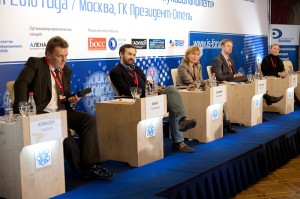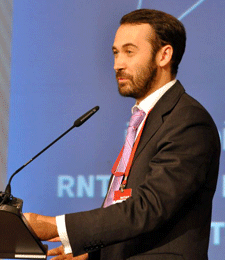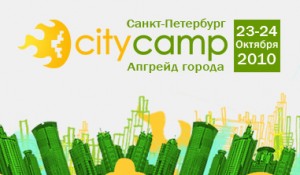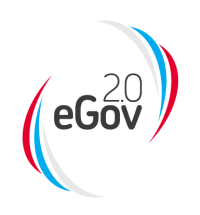Archive for the ‘eGovernment’ Category
As we stated on our project page, today we’are starting our new blog project e-government digest.
November 16 till November 30 2010
01. On March 01 the universal citizen card will be introduced in all subjects of the Russian Federation.
It will replace the regular paper medical insurance policies – Source
02. State and municipal services portal (this is the e-government project which provides all the federal services via web — http://gosuslugi.ru) extends it functionality.
Now citizens can simplify the number of traffic police procedures. They can apply for a drivers license registration, register for a technical inspection or pass the registration of a vehicle.
03. A pilot project “Safe City” is launched in the Stavropol region – Source
04. Republic of Tatarstan: Admissions to kindergartens will be implemented via the web — Source
05. Vladimir Putin has now approved the “Information society” program – Source
06. Municipal departments have to make an electronic signature key on the Government of Russian Federation website – Source
07. The GLONASS based monitoring system will reduce the traffic jams level up to 30% — Source
08. Tyumen: The patient hospital records will become online — Source
09. The government has presented report on its major IT-projects — Source
10. MTS and Moscow Metro began to test the subway fare via cellphone — Source
11. Yandex can now process bar codes — Source
12. Russian traffic police is now ready for an on-line feedback — Source
13. On November 26 the first Russian eGov 2.0 conference has been held. You can read about results here
First Russian Gov2.0 Conference — gov2russia.ru
We had a several month preparations for the conference we’d hold on Friday 26. The primary idea was to show off implemented projects in e-government in elevator pitch mode without idle talking. We already had some working projects in regions: sign up’s to civilian registrar’s and kindergartens, e-registry, payment of road fines via internet, etc.
The whole conference was divided into two parallel streams. The first one was completely devoted to government services (Topics: health, transportation, housing, education, construction, security). The second – e-bureaucrat and Gov 2.0
First stream was moderated by Katya Aksenova. The reporters were lacking of time (But Katia have to follow the regulation rules and speakers had to follow their 5-7 minutes time limits). Our objective was to understand which practical experience could be used in regions and how can we multiply it. How can we create a system for the regions to use the same methods and not to spend their budgets on re-creating the same service, how can we identify the efficiency criteria of such projects. You can read Katia’s report here.
I was in charge of the second stream. First of all I would like to thank the INSOR Russia for their help in organizing great speakers call and I would like to express my big gratitude to the reporters for their clear and logical reports about e-gov practices.
E-bureaucrat and social media usage by the government officials: starting from blog and towards the searching and hiring personnel via web, governor’s complaints book creation, authorities’ micro-blogs, etc. Participants
Questions:
— Officials-bloggers: case studies on issues and the “complaints-to-offer” model usage. My obvious question was when they work while they’re having high activity in theirs blogs.
— Authorities representatives in the web. We were talking about Federal Antimonopoly Committee microblog , http://turchak.ru
— Social media ecosystem creation. We had a great example in Sverdlovsk region with style differs from http://turchak.ru. There is no need to create your own platform , you can just use all relevant social media with your audience. You can setup an aggregation program for the opinions by the specified criteria. The current objective in Sverdlovsk region is 10x increase of IT-projects in the gross-product of region using the powerful resource of creating the lead-community of the business representatives and government in social media
— Monitoring of the efficiency of the officials in the web: Whe the RuNet is mostly negative, and how to convert negative into positive. Mistakes and the analytics of the practices.
— Aggregator projects and officials’ activity ratings in the web: Gosbook, Gospeople.
Before that event I didn’t even know that Stanislav Naumov has written the thesis on the blog significance. Now he is one of the most successful and effective bloggers. Moreover his blog format — deputy minister diary is very interesting from the point that there are legislative restrictions: Stanislav acts in the name of Ministry, that’s why he should be guided by the corporate ethics. Stanislav has very interesting style on Facebook – he actively comments his own posts and also his colleagues blog-posts too. He’s opinion in this – “I don’t think of blog about really effective tool, but it often much easier to ask a question in the morning and to have a feedback by the evening”.
On e-bureaucrat sections we had a discussion if the officials really need to have their own blog. We had a great case described by Openysheva Svetlana — “Looking for a Minister via Web”. My question was about negative wave on that news in Ulyanovsk region. Netizens don’t believe in such news, they think that it’s a farce and PR. How did the authorities struggle with that negative. What is the result of that case? Svetlana clearly described us why she didn’t consider it necessary to moderate the negative comments and why the information about hiring a Minister was placed in her own blog. And how they are trying to scale and multiply that practice.
I would also like to admit the introductory word of Ilya Ponomarev about crowdsourcing in laws’ issuing and the social media impact on the approach to the officials in the web. The core of the discussion is that previously the official had his “sacred” power, but now he act as the manager of the direction. The criteria of his effectiveness are completed projects which can be easily tracked back and discussed by the audience. As a result we have a new approach to personnel policy on various levels of the government.
The second section is my favorite – social projects in the web. What is it? Do they really work? Are they supported by the government? According to the logic – all countries around the world are actively using opendata system and civil engagement in the projects, so the people could create projects by themselves and the government doesn’t have to spend huge budgets for the project. They have a successful project in Washington D.C. named “Apps for DC» which was multiplied by the whole country. Code for America is also a good example of government an civil society. They have a logical business approach to those projects. But do we also have it in Russia? Yes we do.
This section is a challenge to all thing I do. I want to, I can and will develop these projects. I’m sure that the government and citizens are in need in such projects. The question is what is the quality and level of these projects and how the conversation with the authorities goes. I was very pleased that almost all of our round table was full by the people developing those projects. We’ve had a detail conversation about pros and cons of projects. At last we’ve developed a model mouthed by Ivan Begtin – “We shouldn’t involve government in the project. We must develop a good working model, then the authorities will be more than interested in the dialog with you”. Ivan is a creator of a lot of Gov2.0-projects and he is working by the exact same way.
Streetjournal.org is having a goof experience. It’s a clone of the foreign SeeClickFix. Alex did a project and then went to the Makar German with a cooperative proposal. In Izvestias before our E-gov he said a thesis: “We have a StreetJournal project, we haven’t invested a dime in it. But we have integrated all of our document management system in that project, and now we have much more appeals through streetjournal than through any other our project ever created”. Alexey Shaposhnikov reasoned that this project would be dead if the government wouldn’t respond. Since January 1, the law is coming into force that would make electronic treatments equal to the paper ones. So the government could support such projects or not but they have to respond on them. Therefore we need to multiply that project on different cities and towns of the country as much as possible.
Also we had an active discussion of crowdsourcing. Especially after the guys from Russian-fires.ru had a PremiaRuneta award. Grigoriy Asmolov had a very interesting attitude towards the different types of crowdsourcing project in the web.
To be continued…
Useful links
Ivan Begtin: Gov2Russia conference results
Ivan Begtin: Continuing the Gov2Russia conference
First eGov 2.0 conference videos
 During the first 2 days of November I held a section’s meetings of the Russian nationwide practical forum «Development of Information Society. E-government. Regions and municipalities» devoted to information society in Russia.
During the first 2 days of November I held a section’s meetings of the Russian nationwide practical forum «Development of Information Society. E-government. Regions and municipalities» devoted to information society in Russia.
The section’s main topic was network diplomacy, and key speakers — featuring the State Duma deputy Ilya Ponomarev, Tatiana Kanzeveli, Alexander Selivanov, head of political department of Central Executive Committee of United Russia party Alexey Chadayev – were discussing social media activity and blogging of public officers from the standpoint of community relations, including utility of social media for municipalities and response to negative comments.

Deputy Chadayev believes that «officials should not and cannot use the blog as an attribute of an individual, i.e. telling me what he ate yesterday, with whom he went for a walk yesterday, what movie he watched. The question that every leader on every level must set is if he can use a blog to facilitate daily work with people. If not, then there is nothing to do there for me».

Deputy Ponomarev referred to Peter the Great who ordered his court nobility to avoid reading public speeches from paper for «foolishness of everybody to be visible». As Ponomarev said, «in this sense, the very fact of access to the network is extremely positive. However, it is not always that foolishness of the statesman himself that is visible. What is often seen is the foolishness of his media office. But since it is the public servant himself who appoints the media office, this still characterizes his inner world «.

Guest from America on this forum, Tatyana Kanzaveli cited Dmitry Medvedev’s Twitter as a good example of a microblog: «I was surprised with how he writes. The language is not bureaucratic, but rather ‘humane’. I believe that politicians in America, too, must learn to talk like that with the public”.
More detailed informationyou can find at Forum’s website
Here Tatyana’s presentation
Public service of electronic mail for communication between citizens and officials and for public services can be launched in Russia already in the end of this year.
The algorithm is simple: citizens will be able to register e-mail address at post office, wait for registration data, receive public services, and interact with civil servants. This scenario is already fulfilled in case of electronic public services through Gosuslugi.ru.
Use of public e-mail for signatures along with other e-mail addresses won’t be restricted, but use of the new service for private purposes will be prevented with all off-topic messages to other servers blocked. Signatures will be first and last names of subscribers.
Still to be defined is a solution to dilemma of names’ duplication (when 2 individuals or more can have the same first and last names), as well as e-mail boxes’ volume and choice of domain zone. Russian domain .rf suggests Cyrillic keyboard layout, which does not have the symbol “@”.
Public e-mail will be available only through web-interface, not e-mail clients. This should raise information security of new services.
Public services through Internet are becoming ever more popular in Russia since this is one of our top priorities. Supply is catching up with demand and all public services must turn into electronic form by 2015. Cold Russian winter, sloppiness of local customers, interest to innovation and computer technologies warm up demand for gosuslugi.ru, a brand new portal of public services designed especially for those who do not want to waste time in long lines or queues waiting to hand in an application or to receive a signature. As a result, according to Public Opinion Foundation, even among people who cannot use a computer (about 44 percent of population), about 15 percent expressed desire to use services of public institutions and services through Internet.
“Team of Rostelecom involved in designing and building the infrastructure of e-government is only in the beginning of a long way», but «already got a number of key elements of this infrastructure,” Valery Zubakha, director of the project «Electronic Government» in Rostelecom told to a reporter. “The work of rendering priority public services into electronic form is going in full compliance with the schedule approved by the Government of Russian Federation, and in some areas even ahead of it», meaning ahead of schedule.
This is unthinkable how many priority public services have existed for long without electronic form and how Russian citizens could have had already lived without electronic government for so many years! According to the data from Zubakha’s colleagues from Rostelecom, 49 government services are available electronically through the portal gosuslugi.ru, including filing tax returns and licensing of various activities. To understand what areas Zubakha means when he says that it is either in full compliance with schedule or ahead, those are services of 19 agencies: the Federal Tax Service, Ministry of Justice, Ministry of Internal Affairs, Pension Fund of Russia, State Committee for Industrial and Mining Safety Supervision, Rosnedra, Federal Migration Service, Ministry of Foreign Affairs, Rosobrnadzor, the Ministry of Culture, Roszdravnadzor, Healthcare Ministry, Federal Medical Biological Agency, Rosstat, Rosreestr, Rosalkogolregulirovanie, Roskomnadzor, Rosselkhoznadzor, Rosavtodor.
 Most applications (69,573,100,005) were received by the Federal Migration Service (FMS). This includes the 29,259 applications filed for a foreign passport by a citizen aged 18 years or older and 3,700 requests for a foreign passport by a citizen who has not attained the age of 18. Ilya Ponomarev, the State Duma deputy, believes that «this is a significant figure”.?
Most applications (69,573,100,005) were received by the Federal Migration Service (FMS). This includes the 29,259 applications filed for a foreign passport by a citizen aged 18 years or older and 3,700 requests for a foreign passport by a citizen who has not attained the age of 18. Ilya Ponomarev, the State Duma deputy, believes that «this is a significant figure”.?
“But they raise concern because of large number of negative responses about getting foreign passport through the portal of public services. That is, demand is there, but supply is not quite adequate,» Ponomarev said.
 Yesterday I spoke with organizer of CityCamp, a start-up conference in Saint Petersburg, about effectiveness and need for crowdsourcing in such a field as Gov 2.0. Many crowdsourcing ideas will be represented at City Camp, a conference of start-up projects that is taking place in Saint Petersburg on October 23-24 2010. Agenda of this conference includes City Challenge, a competition analogous to Code for America, when a city chooses innovational firms that outsource services.
Yesterday I spoke with organizer of CityCamp, a start-up conference in Saint Petersburg, about effectiveness and need for crowdsourcing in such a field as Gov 2.0. Many crowdsourcing ideas will be represented at City Camp, a conference of start-up projects that is taking place in Saint Petersburg on October 23-24 2010. Agenda of this conference includes City Challenge, a competition analogous to Code for America, when a city chooses innovational firms that outsource services.
Experience of Washington DC and many other cities that held apps for or codes for competitions and tenders shows that such competitions are excellent resources of ideas for projects and for organization of innovative environment, rational from viewpoints of both urban development and commercialization of innovations. This is Gov 2.0 in action with all its pluses and minuses, but also with development of competences on the side of citizens themselves.
For now, this project is launched only in St Petersburg, but I am planning to launch similar initiative in Moscow. Today we already have such crowdsourcing projects aimed at urban development in Russia:
— Russian Fires is one of the best Russian examples of crowdsourcing where the efforts of many people create social (and even vital) project through Ushahidi platform.
— At Streetjournal.org (Perm) customers can report problems in Perm’s area, describe what must be corrected, show the location of the problem on a map, additional photos and video materials.
— Doroga.tv allows to watch the movement of urban transport on the map, traffic jams and so on.
— Rusavtobus makes it possible to run routes, contains a large database on the movement of all modes of transport, including minibuses.
 I am organizing the 1st Russian E-Gov conference on November 15, 2010.
I am organizing the 1st Russian E-Gov conference on November 15, 2010.
Typically scheme of the conference includes long plenary sessions, public lectures on the development of information society, 20-40 minutes reports, and then another discussion of terms and theories. Very little result! Inherent bureaucratic thinking: much is discussed and we will wait for discussions on the proposal next year.
We decided to radically change the situation. We will go small, but determined steps: the principle of efficiency in business. This conference is a platform that combines public and civic decisions that are already implemented. For example, they can be beta stage projects in the field of electronic government. We adhere to the principle of «do not scold, but offer!» . Working logic: civic and business projects can provide the necessary information, contacts or support, and the practices and proposals that can become efficient nationwide. Look through the programm
Key questions:
- How and when is it possible to spend a huge budget to create really working tools?
- Who is logically more interested in implementing e-gov initiatives: government or business?
- Why does Russia have negative attitude to the whole subject of electronic government, and how is it possible to help a history of successful projects to change the situation?
- What can a business and society attain with help of the e-government and wants at all? continue reading
I am going to represent Russia at Communication On Top, a world forum in Davos and the major event in the world of communications in February 2011.
I will be speaking about electronic government and present a paper “Why can electronic government in Russia and the BRIC countries become a stimulus for economic development?”
The goal of the Forum is to provide a platform for discussion on the future development of communications and their role in business and politics. The conference will have several sections, and my paper will be presented in the section of Political Communications.
Participants of the Forum will include such eminent names as Gary Grates, President and Global Managing Director of Edelman Change and Employee Engagement, the strategic organizational communications practice of Edelman; Vittorio Alessio, Executive Director, Media Relations ENEL; Louis de Schorlemer, Director of Communications (Europe) GALLUP; Louis de Schorlemer, Director of Communications (Europe) GALLUP. I am proud to belong to this cohort!
Today I introduce you to Maxim Behar — a member of the Committee’s annual forum Communication on Top, the world-renowned expert public relations, the head of the Bulgarian Association of PR (Chair of the Bulgarian PR Association). continue reading
The government of Russia under a contract with the international PR-agency «Ketchum» (Ketchum) opened the site ModernRussia.com on the economic and social life of Russia.
The portal will cover the activities of the president and the government initiatives of civil society and business, aimed at implementing the ideas of modernization work on the systemic improvement of investment attractiveness of the Russian economy. Creators of the site plan that it will be a platform for discussion of problems of modernization.
ModernRussia.com intends to submit a key foreign audiences, including business leaders, investors, policy makers and analysts with accurate information about the investment climate and economic opportunities in Russia, as well as on policies and initiatives of government and business, reflecting the desire of Russia to upgrade, and looks forward to the discussion of these themes.
The developers are hoping in the active participation of site visitors in discussions on internet forums, their comments, analysis will help the Government find ways to tackle the remaining problems and challenges.
Visitors can either post your suggestions for discussion and comment to already published materials. Prior to publication, as in other similar resource, comment on ModernRussia.com will be moderated, that is to be tested
Alan W. Silberberg
Gov 2.0 Innovator. CEO. Founder, Silberberg Innovations, and Gov20LA.
The Huffington Post
The Coming Wave of Gov 2.0 Mergers, Takeovers and Buyouts is almost upon us. This will mark the second major part of the Government 2.0 revolution:
The Gov 2.0 finance and deal side.
Why is this going to happen?
* Economies of Scale.
* Normal Market Progression
* Recent hot media presence, such as CNN, Business Week, NPR, etc.
* Nascent but growing market with no financial or deal makers of note yet.
The Government 2.0 space is growing. There are lots and lots of small companies chasing their piece of the pie. There are lots of large companies also chasing their piece or trying to make sure their old pie stays the pie. This phenomena will only increase, as the stakes get higher, and the bar for entry also gets higher. Now money matters. It will matter even more as revenue models are fully formed and the real business of Government 2.0 takes off.
There has only been one Gov 2.0 Merger to date of note, GovLoop and GovDelivery. This model is an early one — two information companies coming together. But there will also be «click and brick» mergers — where a defense contractor acquires an app company or vice-versa- an app company acquires a hard line manufacturing company with broad Gov contracts to get access to those contract vehicles.
Silberberg Innovations has positioned itself to be the early Merger and Acquisition specialist in the Government 2.0 Space. With deep industry contacts; practical knowledge of the technology, the trends and the business environment, it is an exciting step for us. While innovating through early Gov 2.0 platform experimentation and culture change discussions, it became apparent there is a vibrant and growing industry getting ready to take its place in our society. While speaking at and producing our own Gov20 events like Gov20LA, it also became clear that this is an industry hungry for fusing business and government — leading towards tremendous market opportunities to be had.







